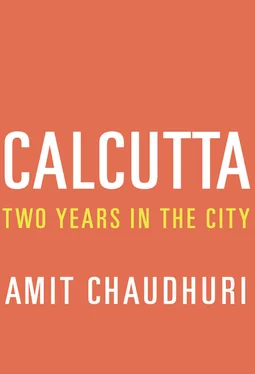Nandigram mobilised sections of the Bengali middle class and its media, and it introduced a new, inebriating celebrity activism into Bengal. Among the famous personalities who condemned the government for its approach to this whole matter of special economic zones was the highly regarded poet Joy Goswami; the filmmaker and actress Aparna Sen; and a number of artists, playwrights, theatre people, some of whom were household names in the neighbourhoods of Calcutta because they worked in television serials and soap operas. This was probably the first time in a very long while that public figures had gone public in their criticism of the government. Adding her weight — negligible in literal terms, considerable in symbolic ones — to this outcry was the frail but predominant Mahasweta Devi, seen by many to be Bengal’s foremost living writer, a novelist and short-story writer who’d spent her life working with the tribals, and also making their lives and world her subject matter. From a strange but opportune marriage of genuine passion and outrage, sentimentality and self-promotion, individual conscience and an amoral but hyperactive media, was born a constellation of what the latter named “buddhijibi ,” or “intellectuals,” though not everyone in that group was an intellectual, and not by any stretch was every intellectual or writer or artist of stature in that group. Nevertheless, the buddhijibi were here, a posse of recognisable faces, and Mamata Banerjee probably sensed that their emergence had a bearing on her political future. No doubt some of the buddhijibi — that is, those who had embryonic political ambitions — realised that Mamata’s re-emergence would be significant to their plans. Who made the first overture to whom is difficult to tell — but, suddenly, the buddhijibi and the Trinamool Congress were speaking from one platform.
This is not to say that the buddhijibi became paid-up members of the Trinamool Congress; though one or two of them did. But the affiliation was a powerful one. Until that moment, no self-respecting Bengali artist or intellectual had come out openly against the Left. The Left was identified with “the people”; and no artist — anyway in a vulnerable position in this regard, open to accusations of elitism and irrelevance — would want to distance themselves from that large, imprecise constituency: the common man. With Nandigram, and then Singur, the Left demonstrated it had turned decisively upon “the people”; and Mamata Banerjee, who had for years fought the Left not on right-wing, but on populist terms, attempting to poach “the people” from a Marxist agenda and make it hers, now found a successful formula for making that populism work for her. The Left Front government had behaved with its usual high-handedness, with a conviction about its own immunity to opposition, in Nandigram; but Nandigram fought back. A handful of buddhijibi cheered them on. The Left was misled by its own hubris, and humbled by the treachery of development.
Nandigram was an unexpected setback; but the critical blow was struck at another obscure village, Singur. Its largely agricultural land was appropriated for the factory that would build the world’s cheapest small car, Tata’s Nano, worth only $1,500. This toy-like ill-fated vehicle, whose destiny it was to look as if it had been prematurely brought into the world, more foetus than car, and whose birth was near abortive and then indefinitely delayed, this car, when it finally took to the road, turned out to have an engine that at times exploded mysteriously. Until 2009, it was seen to be Bengal’s quirky but irreplaceable mascot for development. But the acquisition of Singur’s land had also been thoughtlessly, violently executed: the thoughtlessness of a cadre-based, “grass-roots” party now inured to the democratic process. The small fortress of Singur — a reminder of how many potential principalities there are in India, of how many conflicting and legitimate desires qualify “development”—was shored up by the Trinamool Congress, by the media, by the buddhijibi. Just how much Ratan Tata — an ingenuous-looking man, who at certain moments appears deceptively vacant — played the puppet-master to the government is hard to tell. But it’s clear that little Singur had taken on not just the CPI(M) or Tata but what the middle class with swelling fondness and pride refers to as “India Inc.” For the first time I can recall, Ratan Tata sulked and threatened; then he withdrew the operation. By now, Buddhadeb Bhattacharya’s government — always eagerly self-questioning, always openly humane and fallible, the last democratically elected communist outpost in the world — had become adept at embracing defeat. This unique capacity for martyrdom — the martyrdom of both the party and the state of West Bengal — had become its single most striking feature. Singur was decolonised; where did that leave Singur, or, for that matter, Bengal?
I had all this in mind when I decided to meet Nirupam Sen a second time. A few weeks remained until the election; and it seemed like a good idea to gauge his mood and to continue our last conversation. The events I’ve described have a direct bearing upon two of the portfolios held by this (his detractors would say, deliberately) self-effacing man, portfolios that made him, in effect, the second most important person in the government: commerce and industry; and industrial reconstruction. Although the spotlight hardly ever fell on him, he’d have seen those events as a rebuttal of his tenure: neither he nor Bhattacharya had achieved what they’d set out to do. As a consequence of Singur, the Left had done poorly in the general elections in 2009. Then there was another setback. The Left, at least from the outside, looks like a family, its cohesiveness augmented by its private language. Its intensity derives from the fact that it’s a family largely composed of, in a manner of speaking, orphans of bhadralok history (for we hardly hear of the mothers and fathers of party members), brought together not by accident but by idealism and its cousin, ideology. Bonds of orphanhood and kinship are particularly charged (as Kipling showed us in The Jungle Book ) when they are self-created, and each party member is probably a bit of everything — mother, father, sibling, friend — to every other member. This emotional undercurrent was revealed whenever older party members — like, say, Subhash Chakrabarty — died, and Biman Bose, the party secretary and spokesperson, burst into tears when making the announcement. When close kinship is forged in this way, the sense of betrayal is probably more acute as well; one always had a feeling that the Left’s suspicion of the Right had a slightly different, more blithe, tone in comparison to the Left’s suspicion of its own ranks. The days of party purges are gone, and they possibly never arrived in Calcutta; nevertheless, the expulsion in 2009 of Somnath Chatterjee — Speaker in the lower house of the Indian Parliament (the Lok Sabha), senior CPI(M) member and protégé of Jyoti Basu — from the Party led many to puzzle over whether all was well in the family. Chatterjee, among the CPI(M)’s most urbane parliamentarians, had had a conflict of interest during a Lok Sabha vote; disobeying a party directive in his incarnation as Speaker, he found himself flung out by the politburo in 2008. This couldn’t have happened, many felt, if Jyoti Basu had been in power. And then came another moment of transition in a time of continual, unpredictable transition and change — this most predictable of occurrences in 2010, the death of a frail, ailing ninety-five-year-old man, Jyoti Basu.
Jyoti Basu, under whom the communists came to power in West Bengal in 1977, and who retired from the chief ministership in 2000, remained astonishingly perky and active — and occasionally abrasive — into his late eighties. He was about eight years older than my father, and my mother would look up from the newspaper whenever Basu’s age was mentioned in a report, and talk (with my father in mind) about how the process of ageing was obviously slowing down these days. When, by his mid-eighties, my father’s steps began to falter and he began to confess, uncharacteristically, even ruminatively, to feeling old, she would reprimand him, reminding him that Jyoti Basu was still ostentatiously ambulant. In no other sense did she much care about the former chief minister. Comprehension had dawned on her when Basu had proclaimed, with his usual unexcitable hauteur, “Ei rokom to kotoi hoi” —“Such things happen all the time”—upon the death of an officer of the state healthcare services, Anita Dewan, who, beaten up along with three others by CPI(M) goons, succumbed to her injuries. Nevertheless, Basu’s continuing capacity to move on his feet provoked in her a grudging admiration.
Читать дальше












